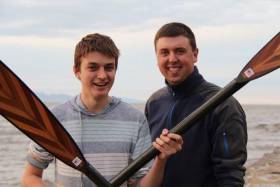Displaying items by tag: Brian Conville
Atlantic Rowers Rescued Off West Cork Days Away From Record
#Rowing - Dubliner Brian Conville is recovering in Tralee Hospital after being rescued by the Irish Coast Guard about 160 miles off Mizen Head this afternoon, writes Tom MacSweeney.
Experienced offshore rower Conville, 25 — who last year crossed the Pacific Ocean from California to Hawaii over 48 days — had been attempting to set a west-to-east record from Newfoundland with Joseph Gagnon, a 20-year-old science student from Quebec.
They set off from St John’s Harbour in Newfoundland a fortnight ago, originally intending to head for France, but had changed their plans and rerouted for the Irish coast, hoping to reach West Cork within the next few days.
Those plans were scuppered this morning when the pair’s boat overturned, activating its EPIRB signal which was picked up by Valentia Coast Guard.
Waterford’s coastguard helicopter Rescue 117 was quickly dispatched for a successful airlift of the two casualties, who have been treated for mild hypothermia but are said to be in good spirits, according to RTÉ News.
Speaking about the rescue, the Irish Coast Guard’s Gerard O’Flynn said: “It highlights that if you can raise the alarm and stay afloat, then you stand a very good chance of being rescued.
“I also want to compliment the helicopter crew and Valentia [station] on a very successful operation and thank the Air Corps for their support.”
Had Conville and Gagnon completed their voyage, they would have been the second Atlantic record-setters this year after solo rower Gavan Hennigan paddled in the Talisker Whisky Atlantic Challenge this past February.




























































